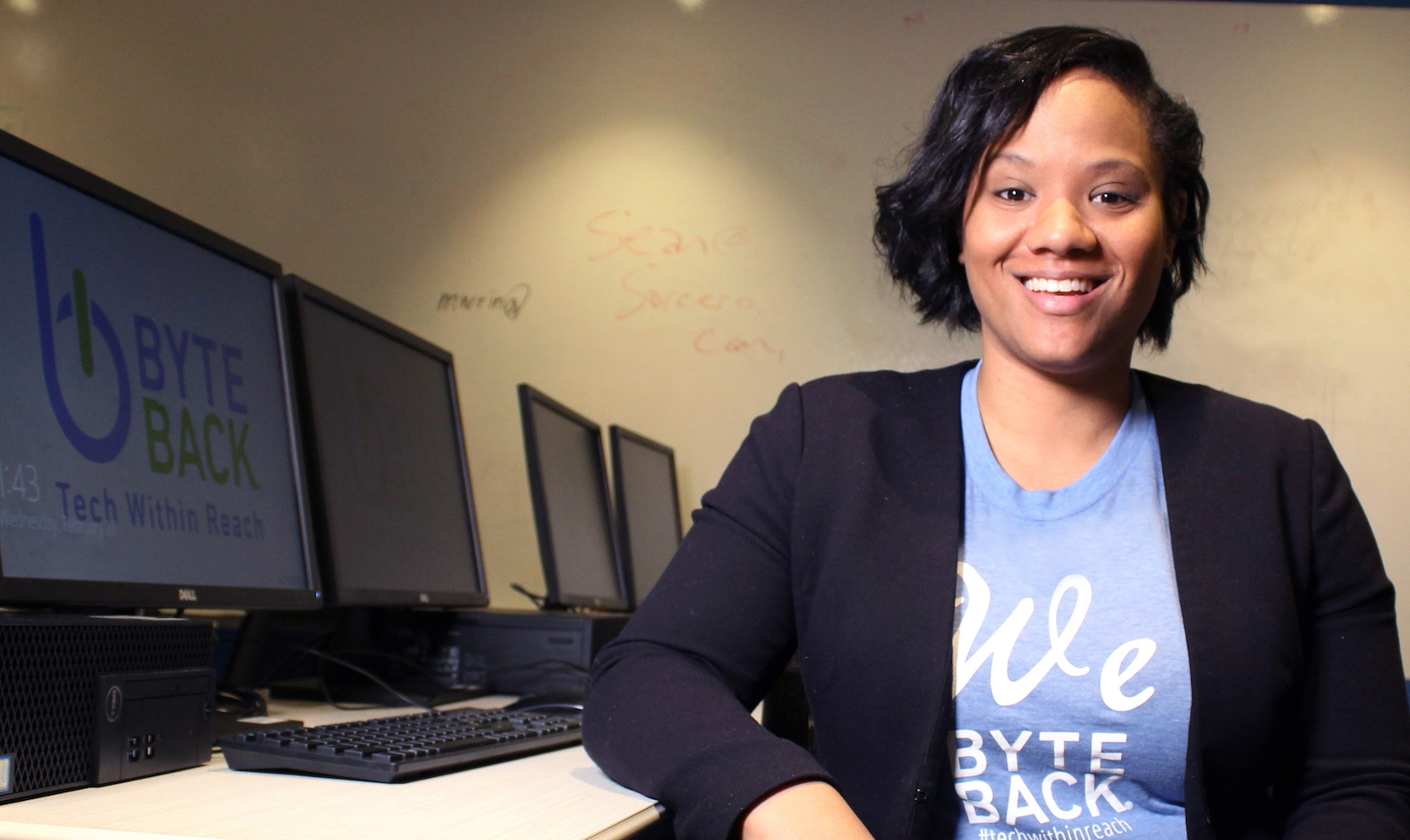This summer, the line separating low-wage jobs from living-wage careers can be crossed with Byte Back’s free computer literacy classes now available in Baltimore, the nonprofit’s latest expansion. Byte Back, which strives to provide a pathway of inclusive tech training that leads to living-wage careers, also offers courses in Washington, D.C., and Prince George’s County, Maryland.
“There was a lot of research and development before they brought me on to find out which city made sense,” said Baltimore’s site director, Chrissie Powell (pictured). “I don’t want to say it’s just digital illiteracy [that’s the problem], but it’s isolation. So many adults have been isolated and have been left out of the digital transformation of our economy … it’s truly an epidemic in our nation.”
According to a study from the U.S. Department of Education, 74 percent of adults in the United States use a computer at work. For the 16 percent of adults in the U.S. who are not digitally literate, these jobs are far from entry-level.
“We chose Baltimore City specifically because we know Baltimore’s poverty rate is at 22 percent. And that’s more than double Maryland’s poverty rate of 10 percent,” Powell said. “With that level of poverty, we also know there is a great opportunity. We know there are tens of thousands of tech-related jobs in the Baltimore area that are not filled and so many of those jobs do not require a college degree — they require certification.”
Serving 536 students in 2018, 97 percent of whom were people of color, Byte Back’s bottom line is to open the doors to living-wage careers for those who need it most. Sixty-seven percent of students were receiving government aid when they began classes, and 66 percent were unemployed.
According to their 2018 Annual Report, Byte Back alumni started earning, on average, $27,599 more annually.
Byte Back started in the district 22 years ago, founded by then-computer programmer Glenn Stein and elementary school teacher Barbara Altman. By providing free computer training courses and housing students for the duration of their program, Byte Back created a community of learners that has increased exponentially.
Today, most of the district’s prospective students hear about Byte Back through word of mouth from past students, according to Powell. In Baltimore, the networking starts through community partnerships.
Before taking on the role of Baltimore’s executive director, Powell connected with workplace development programs when working in business and engagement at Goodwill Industries of the Chesapeake. Until Byte Back Baltimore gets its own site in spring 2020, these community partnerships are providing spaces within their own organizations where the classes can be taught.
Year Up, a national organization aimed at getting young adults the opportunities necessary to reach their potential, has already begun a six-week bootcamp of computer fundamentals, in which 100 percent of the class passed their midterm.
The Baltimore- and Washington-based nonprofit Living Classrooms is currently hosting a cohort of young women supervised by the Department of Juvenile Services who are taking Byte Back’s Microsoft Office Specialist Certification classes.
While the community partnerships make Byte Back possible in Baltimore, the site expansion itself wouldn’t be a reality without the annual TD Ready Challenge by TD Bank Group. Offering a $1 million (CAD) grant to up to 10 organizations that aim for innovation in North America, the Ready Challenge was created to reward programs that create inclusivity for the future. Byte Back was a recipient of one of the 2018 grants.
“Organizations such as Byte Back are confronting tough challenges related to the future of work head-on,” said Andrea Barrack, global head of sustainability and corporate citizenship for TD Bank. “Hearing [Byte Back Executive Director] Elizabeth Lindsey, myself and the other 14 judges included were confident that Byte Back, and the other nine recipients, best demonstrated a solution that could have the potential to make a significant impact on communities that are at risk of falling behind due to technological advancements.”
Teaching adult learners the fundamentals of computer knowledge opens the doors to a different class of living, but Lindsey wanted to ensure their chances for success even more so with the pathways program.
“She aligned everything, and really came in with great strategy to create something called a pathway, where we’re not just teaching individual classes, it’s not just a one and done,” Powell said. “We have a pathway to living-wage careers, where an adult learner can come in, start at the very foundational level … and matriculate into more advanced classes. They’re able to pick a pathway, whether it be as an IT professional obtaining their certifications so they can go into careers such as a help desk support technician, or they can pick an administrative pathway where they learn Microsoft Office Suite, which will support office receptionists, administrative assistants, receptionists in hospitals, nonprofits, really any job at a desk in an office setting.”
Byte Back’s innovations like the pathways program are just one step closer to their goal of expanding classes nationally, one community at a time. Their success offers a model to chief learning officers who plan on developing new programs.
“When you go into a community, whether it be your own or a new city, really get in there and learn the culture,” advised Powell. “It’s really important not to go in saying, ‘oh this is what we offer.’ It’s really not about what we offer. It’s about what the community needs. At the end of the day, we cannot succeed if we don’t have the support of the community.”
While many prepare themselves for the jobs and industries promising to boom in the upcoming years, Byte Back keeps their skill development focused on today’s horizon. Giving adult learners the chance to reskill with the tools they need for today’s job market leaves the door wide open for those who want living-wage careers.















